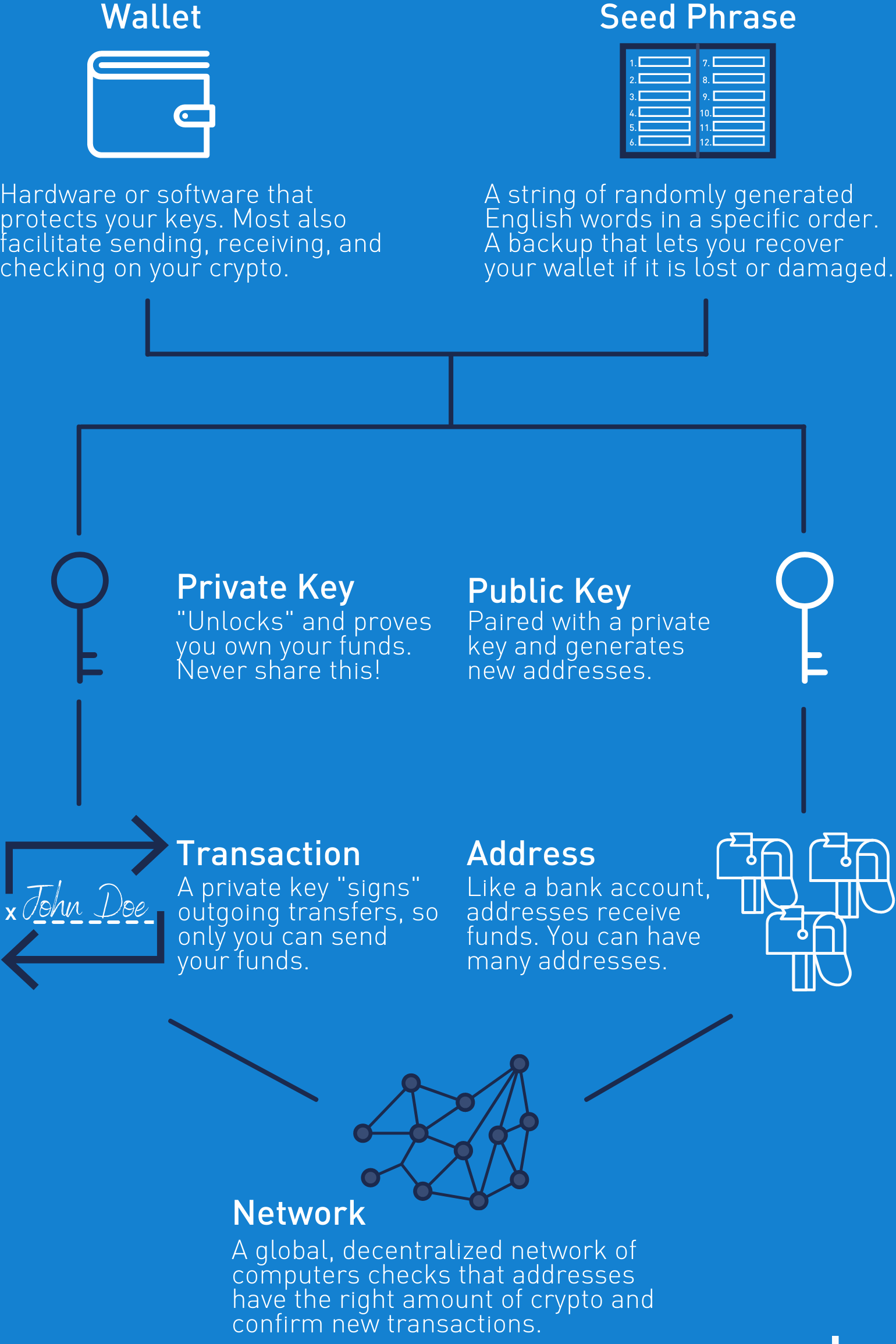Crypto Wallets are essential tools for securely storing, sending, and receiving cryptocurrencies. With advancements in technology and growing crypto adoption, choosing the right wallet in 2025 is critical for both beginners and seasoned traders.
What Are Crypto Wallets?
Crypto wallets are digital tools that allow users to store and manage their cryptocurrencies. They provide private keys that grant secure access to the funds stored on blockchain networks.
| Type of Wallet | Definition | Features | Examples | Who It’s Best For |
|---|---|---|---|---|
| Hot Wallets | Internet-connected wallets for frequent and convenient access to cryptocurrencies. | Easy to use, supports multiple coins, and integrates with dApps. | MetaMask, Trust Wallet | Active traders and users interacting with DeFi or NFTs. |
| Cold Wallets | Offline wallets for maximum security, storing keys in a physical device. | Immune to online threats, suitable for long-term holdings. | Ledger Nano X, Trezor | Investors focused on security and storing large amounts of crypto. |
| Mobile Wallets | App-based wallets designed for smartphones, balancing usability and portability. | Multi-chain support, user-friendly design, and portability. | Exodus, Mycelium | Beginners and casual users looking for a mobile-first solution. |
| Desktop Wallets | Installed on PCs or laptops for advanced features and greater control over transactions. | Secure and feature-rich with customization options. | Electrum, Atomic Wallet | Experienced traders who need detailed transaction controls. |
| Web Wallets | Accessible through browsers; generally provided by exchanges or third parties. | Convenient for quick access but requires trust in the provider’s security measures. | Binance, Coinbase Wallet | Users who prioritize ease of use and integration with exchange accounts. |
| Paper Wallets | Physical document containing printed private and public keys. | No digital trace, highly secure if stored properly, but susceptible to physical damage or loss. | Custom-generated wallets | Tech-savvy individuals looking for offline and budget-friendly storage. |
Top Crypto Wallets for 2025
1. MetaMask
Overview: A hot wallet ideal for DeFi and NFT transactions, supporting Ethereum and compatible blockchains.
Features:
- Browser extension and mobile app.
- Seamless dApp integration.
- Advanced transaction settings like gas fee customization.
2. Ledger Nano X
Overview: A cold wallet offering industry-leading security for long-term investors.
Features:
- Supports 1,800+ cryptocurrencies.
- Bluetooth connectivity for mobile pairing.
- Secure Element chip for maximum data protection.

3. Trust Wallet
Overview: A mobile wallet supporting over 50 blockchains and numerous tokens.
Features:
- Built-in exchange for token swaps.
- Multi-chain staking options.
- Non-custodial, ensuring user control over private keys.
4. Trezor Model T
Overview: A cold wallet offering advanced encryption for added security.
Features:
- Touchscreen for easy navigation.
- Open-source firmware audited for transparency.
- Backup and recovery systems for key management.
5. Exodus
Overview: A hybrid wallet available as a mobile and desktop app, combining sleek design with robust functionality.
Features:
- Multi-currency support for 260+ assets.
- Real-time portfolio tracking.
- Seamless integration with hardware wallets like Trezor.
Pros and Cons of Crypto Wallets
| Wallet | Pros | Cons |
|---|---|---|
| MetaMask | – User-friendly interface. – Integrates with dApps for DeFi and NFTs. – Free to use. | – Hot wallet vulnerable to phishing attacks. – Limited to Ethereum and compatible blockchains. |
| Ledger Nano X | – Maximum security with offline storage. – Supports 1,800+ cryptocurrencies. | – Expensive upfront cost. – Requires physical access for transactions. |
| Trust Wallet | – Multi-chain support. – Built-in exchange for token swaps. – Easy for beginners. | – No desktop version. – May lack advanced portfolio management tools. |
| Trezor Model T | – Advanced encryption. – Supports 1,000+ cryptocurrencies. – Touchscreen for ease. | – Higher price than other wallets. – Not as portable as mobile wallets. |
| Exodus | – Sleek design and easy-to-navigate interface. – Supports 260+ assets. | – Limited advanced features for DeFi. – Not ideal for long-term cold storage. |
How Crypto Wallets Work

- Private and Public Keys
Private Key: Equivalent to a password; ensures secure access to funds.
Public Key: Similar to a bank account number; shareable for receiving funds. - Blockchain Integration: Wallets don’t store crypto but act as a gateway to access funds stored on blockchain networks.
- Transactions: Users initiate transactions via wallets, which are validated and recorded on blockchains.
How to Use Crypto Wallets
- Set Up a Wallet: Download the app (for hot/mobile wallets) or purchase hardware (for cold wallets).
- Secure Your Keys: Store private keys offline. Use strong passwords and enable two-factor authentication.
- Add Funds: Transfer cryptocurrencies from an exchange or another wallet to your new wallet.
- Transact Safely: Double-check wallet addresses before sending funds. Use QR codes to minimize errors.
Benefits and Challenges in Using Crypto Wallets
| Aspect | Benefits | Challenges |
|---|---|---|
| Security | – Offers private key protection for funds. – Cold wallets provide maximum security. | – Risk of losing private keys results in permanent fund loss. |
| Accessibility | – Mobile and hot wallets allow instant access for quick transactions. | – Cold wallets require physical access, limiting ease of use. |
| Control | – Users maintain full control over their assets without intermediaries. | – Mismanagement of keys can lead to unauthorized access or loss of funds. |
| Versatility | – Supports a wide range of cryptocurrencies and integrations with DeFi apps. | – Compatibility issues with specific blockchain ecosystems or tokens. |
| Transparency | – Blockchain records every transaction immutably, ensuring accountability. | – Complex interfaces of some wallets can be challenging for beginners. |
| Cost | – Many hot wallets are free; cold wallets have one-time purchase costs. | – Premium wallets and hardware devices can be expensive for entry-level users. |
Future of Crypto Wallets
- Enhanced Security Protocols: Biometric authentication and hardware upgrades are becoming standard.
- Integration with dApps: Wallets like MetaMask are expanding functionality to support more blockchain ecosystems.
- User-Friendly Interfaces: Simplified interfaces will make crypto accessible to non-technical users.
- Regulatory Compliance: Expect wallets to adopt measures ensuring adherence to global crypto regulations.
Related articles:
- What is Crypto Analysis: Types and Strategies – Part 1
- What is Crypto Analysis: Techniques and Indicators – Part 2
- What are some benefits of using cryptocurrency as a method of payment?
- What is cryptocurrency mining? A Beginner’s Guide to Getting Started
- What is Cryptocurrency Solana (SOL) and How Does It Work?
- How to Buy Solana Meme Coins and Create Your Own on Solana
- How to Sell Bitcoin: A Step-by-Step Guide for Beginners
- How to Pay with Cryptocurrency: A Guide to Digital Payments
- What Are Meme Coins & How Do They Work?
- How to Buy Meme Coins: A Beginner’s Guide
- How to Trade in Crypto: Risks and Rewards
- Which are Best FREE Crypto Exchanges & Apps in 2024
- How to Invest in DeFi: A Step-by-Step Guide
- Cryptocurrency Trading: What it is and How to Trade?
- Cryptocurrency vs. Stock Market: Where to Invest for 2025
- Top DeFi Projects and Where to Trade Them in 2025
Sources:
Cointelegraph: What is a Bitcoin Wallet?










